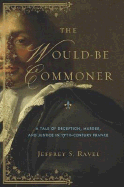

To onlookers, his wife Marguerite Chauvelin seemed less than overjoyed to see him. His old friend Prior Charost (rumored to be Marguerite's lover) was not all smiles. That evening servants and family heard heated arguments and odd noises. In the morning, there was no Louis to be found. There were, however, rumors galore.
The most popular rumor, that Marguerite and the Prior murdered Louis in his sleep and disposed of the body, was the seed from which grew a convoluted criminal case that seized the attention of French society for two years. The Age of Louis XIV may be widely celebrated as Golden (think, La Gloire and Versailles), but Ravel shows that the legal system was made of baser metal.
Murder charges were brought against Marguerite and the Prior by magistrate judges at Châtillon. From the beginning, the case was suspect: one of the magistrates held a long-standing grudge against Prior Charost's family; the evidence gathered was clearly tainted; and, the case depended on two of Marguerite's young maids, whose testimony was probably coerced. Then, in January 1698, Louis de la Pivardière reappeared at Narbonne.
In the rigidly hierarchical and corrupt system that Ravel describes so vividly, Louis's reappearance did not resolve the mystery but only made the handling of the case more complex. Questions of imposture arose (the memory of Martin Guerre and his impostor was still on France's mind); charges of bigamy raised the stakes; the specter of broken vows of celibacy inflamed gossip. Ravel is excellent at showing how the case affected every level of French society all the way up to the Sun King himself. When Henri-Francois D'Aguesseau, attorney general at the Parlement de Paris, was called to retry the increasingly controversial and contradictory case, there was finally hope that the madness would stop. As Ravel says of D'Aguesseau, his "integrity, learning and intelligence offered the court a way to restore confidence in its function." Anyone interested in how contemporary legal justice systems emerged from the primeval ooze will be richly rewarded by this tale.--John McFarland

